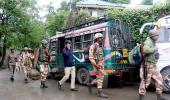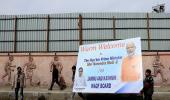Although the Supreme Court has mandated the Centre to conduct the polls by the end of September, a spate of terrorist attacks in J&K could cause delays.

As the Supreme Court's September 30 deadline looms, the prolonged ambiguity surrounding the Jammu and Kashmir assembly polls appears dissipating fast.
Prime Minister Narendra Modi's assertion in Srinagar on Yoga Day that election preparations had commenced was bolstered by the Election Commission's subsequent order to revise electoral rolls.
The electoral body is yet to announce the polling date.
The recent Lok Sabha poll results were on expected lines in J&K.
The Bharatiya Janata Party held its sway in the Jammu region, winning the Udhampur and Jammu seats, while the National Conference secured two of the three constituencies in Kashmir.
These results underscored a persistent political reality: No single party enjoys widespread support across both regions.
In the 2014 assembly elections, the BJP won 25 of the 37 seats in Jammu but failed to open its account in Kashmir and Ladakh.
Conversely, the People's Democratic Party (PDP) and the National Conference dominated in Kashmir, winning 28 and 15 seats, respectively.
Much has changed since 2014. The erstwhile state of Jammu and Kashmir lost its special status and was turned into a Union Territory in 2019, following the abrogation of the provisions of Article 370 of the Constitution.
The UT's electoral map was also redrawn in 2022 through the delimitation process.
The undivided J&K had 87 assembly seats -- 46 for Kashmir, 37 for Jammu, and four for Ladakh.
The new assembly comprises 90 seats, with 47 allocated to Kashmir and 43 to Jammu.
The upcoming elections will test whether these changes affect political outcomes, particularly for the BJP, with an increased number of seats in the Jammu region.
Another critical question is whether the relatively high voter turnout of over 58 per cent in J&K in the general election -- most in 35 years -- will be replicated in the assembly polls.
Aga Syed Ruhullah Mehdi, MP from Srinagar, anticipates continued high voter participation.
"People of J&K will use the polls to express their displeasure and vote against the August 5, 2019 decision. They will see the polls as an opportunity to vote against unelected authorities with no accountability," Mehdi told Business Standard. He also believes the people of Jammu, too, have become disillusioned with the BJP's promises, viewing them as "political gimmicks".
"The BJP is not in a good position in Jammu, which is why its government at the Centre has been delaying the assembly polls," he added.
Ravinder Raina, BJP president in J&K, expressed confidence in his party's preparedness.
'Our pledge is to form the next government independently and have a BJP chief minister. We have to work together to achieve this goal,' Raina told delegates in Jammu earlier this month.

J&K has been without an elected government since June 2018, when the BJP ended its alliance with the PDP.
For the PDP, grappling with a series of setbacks since then, the assembly elections are crucial, after it failed to secure any Lok Sabha seats.
"The party is ready for the polls. Despite many leaders leaving the PDP, our vote share improved in the Parliamentary election... We are confident we will surpass our peak performance," Suhail Bukhari, the PDP's chief spokesperson, told Business Standard, emphasising the electorate's discontent with the policies of the BJP government at the Centre.
The Congress also has high stakes in the assembly polls, having lost both Jammu seats in the Lok Sabha election. The party will contest more seats in the assembly polls and its performance will be vital if the NC and the PDP fail to strike a pre-election deal.
The Congress-NC alliance in the Lok Sabha polls saw both contesting three seats each.
This alliance may persist, but the Congress could also join forces with the PDP, given their shared ideology and that they are part of the INDIA bloc.
In Kashmir, the BJP's position appears tenuous.
The party's fraught relations with regional heavyweights NC and PDP, coupled with unsuccessful backing of smaller "like-minded parties" in the Lok Sabha polls, might necessitate a strategic rethink.

Although the Supreme Court has mandated the Centre to conduct the polls by the end of September, a spate of terrorist attacks in J&K could cause delays.
The home ministry's recent decision to grant more powers to the lieutenant governor on matters related to police and all-India service officers has drawn ire from nearly all regional political parties, which argue it disempowers the people.
Speculation is rife that polls will be held after the Amarnath Yatra, with the Election Commission needing to act swiftly once the pilgrimage ends on August 19.
Any extended deferral, amid chances of an early, harsh winter, risks delaying the assembly polls until 2025.
Feature Presentation: Aslam Hunani/Rediff.com











